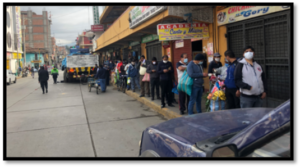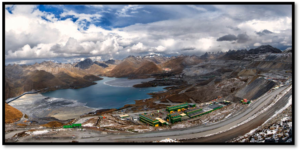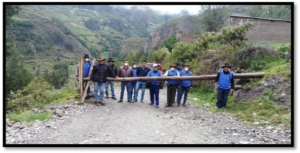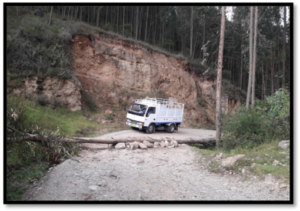Sam Hulsey | Huaraz, Ancash, Peru |
As COVID-19 grabs the spotlight on all major news outlets around the world and the US becomes the emerging epicenter of a global pandemic, Andean communities are racing to reduce the risk of a major outbreak that would all but overrun an already ill-prepared public health system. The Peruvian government initiated the first of a slew of hardline preventative measures on March 15th, declaring a national state of emergency that entailed a lockdown on all non-essential inter-departmental and inter-provincial transit, the temporary closing of all borders and international ports of entry (including the Jorge Chávez International Airport in Lima), and a mandatory curfew between 8:00pm and 5:00am. As coronavirus cases began to multiply in Peru, so did the doubling-down of presidential decrees to ensure appropriate social-distancing among the population. The state of emergency has been officially extended through April 26th, with many predicting it will last well into May. The nation-wide curfew now begins at 6:00pm and a gender-based alternating schedule has been implemented to control the flow of civilians on the street, allowing for only one individual per household to shop for essential goods, with men permitted to leave the home Mondays, Wednesdays and Fridays, and women restricted to Tuesdays, Thursdays and Saturdays. There is a complete freeze on all movement on Sundays.
In the Cordillera Blanca Mountain Range, considered a mecca for mountaineering in the Andes due to its numerous high-altitude glaciated peaks, life has taken a drastic shift from the normal day-to-day operations. In Huaraz, the major urban hub of the Callejón de Huaylas Valley and home to nearly 200,000 residents, police and soldiers patrol the uncharacteristically silent streets, stopping cars at checkpoints throughout the city and interrogating pedestrians on their motives for leaving home.

Men wait for hours in a seemingly endless line to enter Huaraz’s central market on a Wednesday (Hulsey, 2020).
As of April 5th, over 51,000 individuals have been detained for non-compliance with the curfew and social-distancing policies throughout Peru since the state of emergency began. On March 26th, the Regional Police Chief reported more than 800 arrests were made in a span of twenty-four hours throughout Ancash. Several cases of military and police violence towards curfew-breakers have surfaced, soliciting mixed responses from the public and political figures who are split between denouncing and applauding the use of corporal punishment. In an attempt to appeal to populist demands to intensify heavy-handed policies, the mayor of Huaraz, Rory Mautino, took the presidential decrees a step further by restricting hours of operation for all places of commerce in the province from 6:00am to 11:00am, effectively resulting in stagnant winding lines at local banks and a jam-packed scene in the open-air markets, replete with shoves, curses, and swinging elbows.
Two weeks into the state of emergency hopes were high in Huaraz that the inter-provincial transit lockdown would quell the spread of COVID-19 and keep the few emerging pockets of cases contained on the coast. Morale took a stunning blow on March 31st when the first recorded case in the mountainous region of Ancash appeared in the form of a laborer from an Antamina mining camp at Yanacancha in the south-eastern section of the Cordillera Blanca.

The Antamina mining operation at Yanacancha, the south-eastern extreme of the Cordillera Blanca Mountain Range (Fernandez, 2019).
President Martín Vizcarra had exempted mining operations in the suspension of non-essential activities, defending his decision by citing that mines are, “permanently confined and in remote areas”. Antamina is a multi-national, multi-billion-dollar corporation and among the top producers of zinc and copper by volume in South America, representing an important source of revenue for the state through the taxes leveed on their extraction activities. Despite the state of emergency, Antamina continued busing in non-skilled laborers from the coastal towns of Huarmey, Casma, and Chimbote, the latter of which is the epicenter of COVID-19 in the Department of Ancash and the hometown of the man who became patient zero and later transferred to Huaraz.
After the news of the first confirmed case of coronavirus in the mountain range became public, a portion of the over 3,000 local laborers began a protest at the camp, demanding that Antamina suspend operations, provide all workers with tests for COVID-19 and allow them to return home to spend the rest of the quarantine with their families. A video recorded by one of the workers and widely circulated on social media and local news outlets shows an anxious group of employees addressing Antamina’s Safety Superintendent, demanding to be informed about additional suspected cases of coronavirus at the Yanacancha facility: “We’re asserting our rights! We’re demanding our rights,” yelled the workers indiscriminately. In the video, the Safety Superintendent responds, attempting to console the protesting workers: “We receive a lot of false information from outside [the mine]. … We understand your concerns. … The vast majority of us don’t have any symptoms of anything. We’re well. We breathe well – ”. The crowd interjects in a roar of disapproval of this assertion of the superintendent. He continues, “Antamina is doing perhaps better than anywhere in Peru to keep us all as healthy as possible”.
Antamina ardently denies the existence of additional cases, claiming that patient zero worked in a storage unit and only came in contact with two individuals who were subsequently quarantined. The apparent dismissal of potential developing or asymptomatic cases comes in stark contrast to the concerns of workers revealed in an interview with Peruvian newspaper, El Comercio: “We’re all in a panic because they say there are more cases of coronavirus [at the mine], but they aren’t informing us. The workers want to leave because this is a time bomb. There are a ton of people in the cafeteria and just a few have received masks and, in some cases, up to four people share sleeping quarters”. When asked in the same article what preventative measures Antamina is taking to mitigate the risk of a coronavirus outbreak, a spokesperson responded that they are cleaning and disinfecting and promoting social distancing among employees. A District Attorney of Ancash has since opened an investigation of Antamina for violation of sanitary measures and for disobeying and resisting authority. Additionally, an Ancash congressional representative, María Isabel Bartolo Romero, has submitted a formal request to President Vizcarra to immediately suspend all activities of the mine.

Community self-isolation efforts in San Marcos, Huari, (Huarac, 2020)
While residents of the urban centers of the Callejón de Huaylas scrambled to stockpile essential items at supermarkets, many rural highland communities took early action to self-isolate before the state of emergency was even announced. As the coronavirus hype began to grow, each day a new community was featured in local news outlets felling giant eucalyptus trees to block access roads and setting up community-based checkpoints to turn around potential porters of COVID-19. On March 13th, a committee of leaders from communities in the Huayhuash Mountain Range, home to one of the premier trekking circuits in South America, announced the temporary restriction on access to all trails and a prohibition on visits from all tourists, foreign and domestic, to the remote hamlets that surround the range.
In Llupa, a rural community east of Huaraz and home to climate activist Saul Luciano Lliuya, one local leader took to social media posting a video in Quechua in which he pleads with community members to stay away from the urban markets and focus on subsistence agriculture: “The illness they call coronavirus has already arrived in Huaraz. Today, hundreds and thousands are dying from this all over the world. This illness is very contagious. … I ask of you, brothers and sisters, please stay at home and do not go to Huaraz. Here in our community we have plenty to eat, our potatoes, our corn, our beans and tubers. This isn’t going to last fifteen or twenty days, but months”.

Community self-isolation efforts in Hualcán, Carhuaz (Municipalidad de Pichiu Quinhuarangra, 2020)
As the clock strikes 6:00pm on day twenty-four of the nation-wide quarantine, a five-minute chorus of police sirens and whistles erupt in Huaraz, dogs bark in response, and then there is silence. Official stats indicate 4,342 confirmed cases of coronavirus throughout Peru, up by 1,388 cases from the previous day, with 122 deaths attributed to the illness. It is anyone’s guess how long the new pandemic regime will endure below the glaciers of the Cordillera Blanca and even harder to predict the lasting impacts of the authoritarian precedents being set worldwide. Despite the uncertainty, we are all optimistic that the epidemic curve will begin to flatten and that mountain roads will eventually be cleared of the eucalyptus barricades.
References:
Áncash: Más de 800 intervenidos en 24 horas por no acatar aislamiento social obligatorio en la región (2020, March 7). Ancash Noticias. Retrieved from http://www.ancashnoticias.com/2020/03/27/ancash-mas-de- 800-intervenidos-en-24-horas-por-no-acatar-aislamiento-social-obligatorio-en-la-region.
Chávez, M. (2020, April 5). Huaraz: desde mañana mercados, markets y bodegas solo atenderán de 6 a 11 de la mañana. Ancash Noticias. Retrieved from http://www.ancashnoticias.com/2020/04/05/huaraz-desde-manana-mercados-markets-y-bodegas-solo-atenderan-de-6-a-11-de-la-manana.
Coronavirus en Áncash: Confirman primer caso en Huaraz. Ancash Noticias. Retrieved from http://www.ancashnoticias.com/2020/03/31/coronavirus-en-ancash-confirman-primer-caso-en-huaraz.
Coronavirus: Separan a militar Christian Cueva que golpeó a joven que incumplió toque de queda en Perú [VIDEO] (2020, March). El Bocón. Retrieved from https://elbocon.pe/trends/coronavirus-separar-a-militar-que- golpeo-a-joven-que-incumplio-toque-de-queda-en-peru-cuarentena-covid-19-video-noticia.
COVID-19 Information. (2020, April 4). U.S Embassy in Peru. Retrieved from https://pe.usembassy.gov/covid-19-information.
Fernandez, J.P. (2019) Photograph of Antamina mine at Yanacancha. Retrieved from shorturl.at/yKNP2.
Huarac, M.L. (2020, April 6). MAS RETENIDOS QUE COVID19 EN CARHUAZ. Hoy la policía nacional, ejército y serenazgo en un trabajo conjunto retenieron 50 personas, que no justificaron su tránsito como indica la norma de emergencia nacional y el aislamiento social obligatorio para que no se propague el coronavirus. [Photograph] Retrieved from shorturl.at/enoZ7.
Huarac, M.L. (2020, March 28). Iniciativas de restricciones en mayoría de nuestros pueblos y comunidades en esta semana se ha concretizado como acciones de autocontrol. ¿Estas medidas tomadas en que ayudará en esta emergencia nacional? [Photograph]. Retrieved from shorturl.at/gloD3.
Manco, A. (2020, April). Antamina: Fiscal abre investigación preliminar contra minera por caso de COVID-19. Convoca. Retrieved from https://convoca.pe/agenda-propia/antamina-fiscal-abre-investigacion- preliminar-contra-minera-por-caso-de-covid-19.
Milla, N (2020, March 31). Alerta Huaraz, tomemos conciencia con esta enfermedad de COVID- 19. [Facebook Video]. Retrieved from https://www.facebook.com/nehemio.milla/ videos/ 2667777620134162.
Municipalidad de Pichiu Quinhuarangra (2020, March 20). “La Unión hace la Fuerza” El Alcalde del Distrito de San Marcos y los Alcaldes de los Centros Poblados, Pichiu Quinhuaragra, Pichiu San Pedro, Quinhuaragra, Santa Cruz de Mosna y República de Uchuhuayta. [Photograph]. Retrieved from shorturl.at/ekpyH.
Paz, D. (2020, April). Coronavirus: mineros exigen pruebas de descarte ante aumento de casos [VIDEO]. La Republica. Retrieved from https://larepublica.pe/sociedad/2020/04/03/coronavirus-en-peru-mineros-exigen-pruebas-de-descarte-ante-aumento-de-casos-ancash-huaraz-lrnd.
Urbina, L. (2020, April). Áncash: obreros de minera Antamina piden paralizar actividades por temor al COVID-19. El Comercio. Retrieved from https://elcomercio.pe/peru/ancash/ancash-obreros-de-minera-antamina-piden-paralizar-actividades-por-temor-al-covid-19-noticia/?ref=ecr.

